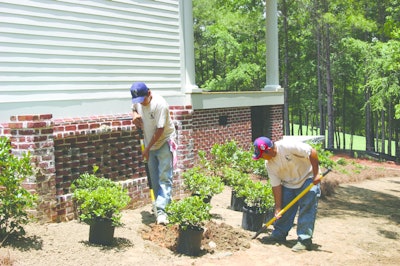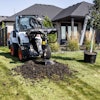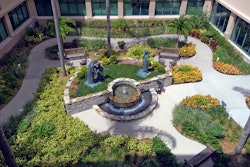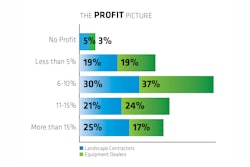
Thanks to an economic turnaround, your customers/clients will likely have some money to spend on landscapes in need of refurbishing this year. This issue's Pro Panelists with expertise in this area offer suggestions for getting the most out of enhancement opportunities.
What to sell
“Upon taking on a new account, we provide a property evaluation outlining deficiencies and potential improvements,” relates Matthew Johnson, president of All Year Round Expert Tree & Landscape Management in Phoenix, AZ. “Our company offers installation and maintenance services starting with irrigation-efficiency upgrades in the form of nozzles, ET controllers, system balancing, audits, and special water-efficiency programs with constant controller monitoring.”
Other enhancement services Johnson's company offers include:
- Turf and soil programs to control weeds and improve soil and turf conditions
- Arbor services from pruning to deep-root fertilization
- Lighting upgrades with LED lighting to replace halogen and adding more lighting areas
- Paver, curbing and other hardscape repairs
- Enhancing patio areas or entryways with pavers
- Monument signs for HOA and other businesses
Jon Ewing, green industry consultant and former landscape contractor, has a similar list that includes irrigation retrofits and smart controllers. “Irrigation retrofits designed toward water efficiency are very important in California and areas suffering from drought,” he emphasizes. “This service presents strong opportunities often well received from customers.
“Sustainable landscape renovations designed with a bias toward efficient water use and turf reduction for areas where water use is limited provide other problem-solving opportunities," Ewing adds.
Ewing notes that installing annual color and making entry- and focal-area improvements with an eye toward style and curb appeal are popular enhancements. “Be mindful of both short- and long-term opportunities,” he emphasizes. “For example, adding color bowls or pots may open up repeated and seasonal opportunities.”
How to sell
Within the first 30 days of being contracted for services, Johnson’s company proposes a list of both critical and suggested repairs, along with enhancements. Including prices, he notes, can speed up the decision-making process. His company also leverages back flow testing, which is required annually on commercial projects, as an opportunity for clients to try out his company's irrigation services without making a long-term commitment.
How you sell enhancements depends on the size of your company and staffing, adds Ewing. “Smaller firms generally emphasize enhancements through any number of staff members. They gather information and funnel it to those responsible for sales. Larger firms have dedicated personnel who visit properties and investigate opportunities. Often firms will assign enhancement goals to staff as a means to encourage additional sales.”
Todd Reinhart, a partner in Illinois-based Reinhart Grounds Maintenance, continually strives to be proactive when it comes to selling enhancements to his retail and industrial clients. “Ideally, we would have two or three proposals at a time on the table, and schedule account managers to visit. Our goal is to review the proposals on a weekly basis,” he emphasizes.
How to price
“Enhancement work is a golden opportunity to improve your margins,” says Ewing. “It’s an opportunity to charge what I call ‘full-retail’ pricing. It is not nor should it be viewed as work performed through wholesale or competitive pricing."
Reinhart agrees, adding, “Since 2008, the entire marketplace has changed. If we can’t make a 50% gross margin on enhancement work, we will have to re-evaluate the job. This requires, of course, a thorough understanding of our numbers.”
All Year Round has standard retail pricing—and as the volume grows, so does the discount. “I always show clients the discount and mention it often to demonstrate that we pass along the volume pricing to them,” Johnson explains. “Our pricing is based on material, labor costs, overhead, buffer for complications, and the expected profit margin. These can vary per job depending on the location, project scope, potential for problems, and the client.”
How much work firms generate depends on how aggressive they are in marketing their enhancement services. “I feel landscape management and maintenance firms can target and generate 50% or more of their base contract amounts in additional work,” relates Ewing.
For his part, Reinhart comes up with an enhancement budget based on averaging the last five or six years of enhancement sales as a percentage of the total sales. “Current customers always close at a higher rate than new customers,” he relates. “But it goes back to hitting your initial maintenance sales goals. If you don’t hit those, it is very difficult to hit your enhancement goals for the season.”
“Again, enhancements provide a tremendous opportunity to charge what you feel your services are worth,” Ewing reminds readers. “You are providing a convenience for customers often without the additional cost or burden to them of having to hire a consultant, architect, or designer.”
How to provide enhancement services
Johnson’s company provides most of its enhancement services in house, but occasionally uses a subcontractor. His maintenance crews are trained in mowing, ornamental care, irrigation repairs, and installation because, he notes, it is more efficient to handle most enhancement projects while those crews are on site. For larger jobs, the company has dedicated arbor and construction crews.
Johnson’s approach is in line with what Ewing advises firms that are using his consulting services. “The size of the enhancement project will dictate how the additional work is performed," Ewing says. "Smaller projects can be handled by the regular site crew, while many firms have dedicated crews that are kept busy through enhancements and irrigation repairs and management.”
Reinhart employs a different strategy using dedicated enhancement crews to perform all enhancement services, large or small. “Our maintenance crews are responsible for mowing,” he relates. “We don’t want expensive mowing equipment sitting around idle while their operators install seasonal color programs or other services. This process maximizes the value we’re getting out of our equipment and crews.”
Unsung benefits of enhancement services
Enhancements provide several benefits to landscape contractors, not the least of which is an opportunity to generate revenue at improved margins. As Ewing relates, however, enhancements also offer a number of ancillary benefits when performed correctly. Among them:
- Improves the quality and aesthetics of projects, thus placing landscaping firms in good standing with their customers.
- Increases contact between customers and landscape company staff members, which leads to improved and continued relationships.
- Establishes properties as an excellent site for new customer sales and cultivation.
“Enhancements improve the look of a property, and we want our equipment to be seen on good-looking properties,” says Johnson. “If we cannot make a yard or landscape look good, then the site isn’t a good example of the type of work we do. Improving a property also makes the customer happy and provides better margins than maintenance work.”
There’s one other important reason to offer enhancements, Johnson adds. "No one likes other companies on their jobs. By having a well-diversified list of services, we can be that company on someone else’s property.”




















